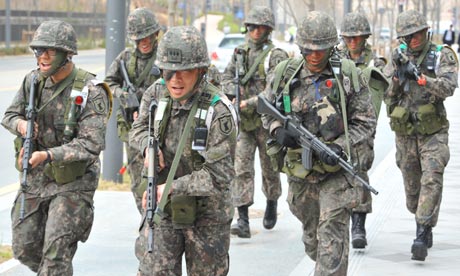But as Congress weighs
immigration legislation expected to expand the
guest worker program, another group is increasingly crying foul — Americans, mostly black, who live near the farms and say they want the field work but cannot get it because it is going to Mexicans. They contend that they are illegally discouraged from applying for work and treated shabbily by farmers who prefer the foreigners for their malleability.
“They like the Mexicans because they are scared and will do anything they tell them to,” said Sherry Tomason, who worked for seven years in the fields here, then quit. Last month she and other local residents filed a federal lawsuit against a large grower of onions, Stanley Farms, alleging that it mistreated them and paid them less than it paid the Mexicans.
The suit is one of a number of legal actions containing similar complaints against farms, including a large one in Moultrie, Ga., where Americans said they had been fired because of their race and national origin, given less desirable jobs and provided with fewer work opportunities than Mexican guest workers. Under a consent decree with the Equal Employment Opportunity Commission, the farm, Southern Valley, agreed to make certain changes
.
With local unemployment about 10 percent and the bureaucracy for hiring foreigners onerous — guest workers have to be imported and housed and require extensive paperwork — it would seem natural for farmers to hire from their own communities, which they did a generation ago.
In fact, the farmers say, they would dearly like to.
“We have tried to fill our labor locally,” said Brian Stanley, an owner of Stanley Farms, which is being sued by Ms. Tomason and others. “But we couldn’t get enough workers, and that was hindering our growth. So we turned to the guest worker program.”
The vast majority of farm workers in the country are not in the guest worker program but are simply unauthorized immigrants. The plan to place those workers on a path to legal status would reduce the chances of their being exploited, the bill’s sponsors say, and thereby also improve the status of Americans who feel they cannot compete against vulnerable foreigners.
Mr. Stanley, like other farmers, argues that Americans who say they want the work end up quitting because it is hard, leaving the crops to rot in the fields. But the situation is filled with cultural and racial tensions.
Even many of the Americans who feel mistreated acknowledge that the Mexicans who arrive on buses for a limited period are incredibly efficient, often working into the night seven days a week to increase their pay.
“We are not going to run all the time,” said Henry Rhymes, who was fired — unfairly, he says — from Southern Valley after a week on the job. “We are not Mexicans.”
Jon Schwalls, director of operations at Southern Valley, made a similar point.
“When Jose gets on the bus to come here from Mexico he is committed to the work,” he said. “It’s like going into the military. He leaves his family at home. The work is hard, but he’s ready. A domestic wants to know: What’s the pay? What are the conditions? In these communities, I am sorry to say, there are no fathers at home, no role models for hard work. They want rewards without input.”
Such generalizations lead lawyers — and residents — to say there are racist undertones to the farms’ policies.
“I am not arguing that agricultural work is a good job,” said Dawson Morton, a lawyer who focuses on farm workers’ rights at the
Georgia Legal Services Program, a nonprofit law firm. “I am arguing that it could be a better job. If you want experienced people, train them. Just because people are easier to supervise, agricultural employers shouldn’t be able to import them. It is not true that Americans don’t want the work. What the farmers are really saying is that blacks just don’t want to work.”
To which J. Larry Stine, an Atlanta lawyer for Stanley Farms and other big farms, replied: “The farmers are not racist or against Americans. They have crops to be picked, and they see that domestics just don’t have their hearts in it.”
Jim Knoepp of the
Southern Poverty Law Center, a nonprofit group that has campaigned against the guest worker program, said that farm work, like other difficult labor, could be made attractive to Americans at reasonable cost, and that farmers should not be excused from doing so.
“There used to be lots of American pickers who moved around the country,” he said. “But wages have stagnated and conditions have deteriorated, and agriculture is unwilling to make these jobs attractive. Think of trash collection. That’s not very appealing, either. But if you offer a decent wage and conditions, people do it.”
Cindy Hahamovitch, an expert on guest worker programs at the College of William and Mary in Virginia, said that in the 1970s about two-thirds of farm workers were Americans and a third were foreign, and that a decade later the proportion was reversed. Today, she said, the vast majority of farm workers around the country are immigrants, although not in the guest worker program.
Republicans in Congress, mindful of the Democrats’ desire to bring legal status to the nation’s 11 million unauthorized immigrants, have made an expansion of the guest worker program a key element of any deal. Current proposals include increasing the number and category of temporary workers to the dairy and construction industries, and increasing their stays from a matter of months to three years so that employers have the workers they say they need.
The guest workers who are planting cucumbers for Southern Valley and harvesting onions for Stanley Farms are among 10,000 holders of H-2A visas in Georgia this year and 85,000 nationally. They are generally guaranteed a minimum wage of just over $9 an hour, but are paid per piece and can boost those wages by increasing their productivity. Other workers, known as H-2B and numbering around 65,000, labor in other businesses in which there is a demand for temporary or seasonal workers, including hotels.
Employers must show that they have tried to hire Americans through advertising and other means and that they could not attract enough of them before resorting to the H-2 system. In the litigation that resulted in the consent decree with Southern Valley, the federal government argued that the effort had not been made or had been intentionally not serious. Excuses were used not to hire locals or to fire them — training was minimal, and people were fired when they were less skilled than others who had been doing the work for years.
“You’ve got some people who don’t work as fast as Mexicans, but they don’t teach you, and it can be learned,” said Misty Johnson, who was fired and then rehired by Southern Valley as part of the consent decree.
For the past few months, Southern Valley has been required to provide daily bus transportation to the farm and demonstrate that it was training and retaining Americans. But a recent inspection of those efforts left federal officials unimpressed.
Southern Valley officials make no secret of their belief that the consent decree — the free bus, the orientation program they now run and the training — is a waste of their time and money. They assert that there is no discrimination and that they would prefer to hire locals if they could.
Lawyers for the local workers say the system is rigged to favor low-cost foreign labor because, given the conditions and the pay, no one else will do it.
“If you can’t find locals to do the work, why is the answer to bring in people who have little protection and not grant them legal status?” asked Mr. Knoepp of the Southern Poverty Law Center. “If we need them, why not bring them in and make them legal citizens with real protections? The answer is because then they wouldn’t keep working in the fields given the conditions of that work. They would do something else. It doesn’t have to be this way.”












 Unbeknownst to those Americans who do not listen to conservative talk radio, there exists a long-standing feud between some of the most well-known names in the business. The most widely-known battle has been between
Unbeknownst to those Americans who do not listen to conservative talk radio, there exists a long-standing feud between some of the most well-known names in the business. The most widely-known battle has been between 




